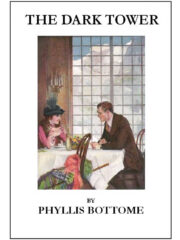“Keep away from me if you think I’m getting into trouble, because I sha’n’t be getting into trouble, I shall be getting out of it, d’you see?”
The guns sounded nearer, a machine gun rattled sharply in their ears, as if it had been let off in their dug-out.
“I sha’n’t care for anybody else,” said Lionel, quietly, “and I shall wait all my life for her. As for not being killed — you don’t want me to shirk my job, of course; bar that, I sha’n’t ask for trouble.”
Winn said, “All right — then that’s that! I’m going to sleep.”
They neither of them slept.
It came very quickly and confusedly toward dawn. The silence was rent across like a piece of torn silk. The crash of bombs, the peppery, sharp detonation of rifles broke up the sullen air. Out of the dark, vague shapes loomed, the trench filled with the sound of deep breathing and scuffling, and the shriek of sudden pain.
Death and mud and darkness closed together.
It was all over in half an hour, the attack was driven out, and the men moved uncertainly about, trying to discover their dead, and relieve their wounded.
The dawn was gray and in the half light, Winn saw Lionel’s eyes open and shut; the blood was pouring from a hideous wound in his side.
“You’ve got to live,” Winn said grimly, bending over him. “No damned nonsense about it! You’ve got to live.” Lionel’s eyes closed again and he knew nothing more of the rough bandaging, the endless waiting in the sodden trench while Winn sat motionless beside him, watching his flickering breath. In the hours of the interminable journey, Lionel roused himself sometimes and heard again like a perpetual refrain, “You’ve got to live.” The motor ambulance jarred and bumped it, the wheels of the train echoed it through the fever in his brain. He woke in England knowing that he was going to live.


"The Dark Tower" отзывы
Отзывы читателей о книге "The Dark Tower". Читайте комментарии и мнения людей о произведении.
Понравилась книга? Поделитесь впечатлениями - оставьте Ваш отзыв и расскажите о книге "The Dark Tower" друзьям в соцсетях.